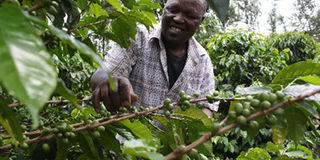Fight poverty, free coffee from clutches of thieves and con men

Fredrick Kinoti inspects his coffee berries in Nthimbiri Village in Imenti North on April 13, 2016. The peasant farmer grows 60 per cent of Kenya’s coffee in some 31 counties. He has the capacity to increase production tremendously, doubling or even tripling production in a few years. PHOTO | PHOEBE OKALL | NATION MEDIA GROUP
What you need to know:
- In some communities, a man cannot carry himself with respect if he does not have a few coffee trees. It is still a mark of some standing and prosperity in villages where folks do not have much.
- The recommendations of the Task Force on Coffee Sub-Sector Reforms are the most honest and far-reaching proposed for the crop.
Mr Peter Thang’wa, 42, is a delightful rogue of a man. He is abjectly poor, but beneath the grit and damage wrought by drink, there lies a quick wit and a mischievous sense of fun.
“That’s a pick-up. No, right there is a (Mitsubishi) FH,” he said, calculating how much he would earn in a year if the coffee business were not inhabited by broker-eat-farmer piranhas in suits.
I had driven into the village of Kibichoi with my colleague, John Kamau, to follow up the coffee story, a battle we have been fighting for some time.
The village is in Githunguri constituency, bordering Gatundu South. To the east of the village is a world that looks more like Switzerland than Kiambu: endless rows of neat, dark green coffee, heavy with berry.
If you wound down your window, you could smell the familiar pesticide.
There are lakes and estates; few matatus and peasants. The roads are glass-smooth, deserted, and a delight to just drive on. It is the kind of place you could take an afternoon to just drive around and relax.
Further up the road is total bedlam. The roads are the worst I have ever seen, with potholes so big that villagers come out and fill them with soil otherwise vehicles would not pass.
At intervals are crowded shopping centres with people milling around casks of beer which have just been delivered. The buildings all look like they date back to the 1950s.
Each centre looks just like the next one. There are few new buildings, if any.
We have come to speak to four coffee farmers, two from Kibichoi and two from across the ridge in Gatundu South. Our host, Mr Stephen Waweru Ragae, is an impressive, barrel-chested giant of a man whose sense of business and strength of character marks him out as a likely millionaire. He is calm, is not excitable, but he is outspoken and blunt.
The officials of the local cooperative will never allow him to speak at meetings, someone tells me.
Githunguri is known for its cows and milk, but our host has a different but very successful business model. Rather than keeping cows for milk, he buys small calves and cares for them until they are ready for fertilisation. Then he sells each for Sh150,000, building an impressive cash flow for himself.
In some communities, a man cannot carry himself with respect if he does not have a few coffee trees. It is still a mark of some standing and prosperity in villages where folks do not have much.
MISLED LOT
These poor farmers are sustained by pride, hope, and love for the soil. If you ask them why they are still farming a crop that requires them to get money from elsewhere to feed, they tell you that they live in hope that something will be done to the corrupt chain that has rendered them so poor.
Some of the misery is self-inflicted. The management of some cooperatives have made common cause with crooked millers and middlemen to fleece members.
Any farmer elected to the cooperative management changes overnight: he dresses better, his skin tone changes, he buys a car. That is because there is a lot of outright theft of members’ funds.
Some cooperatives keep as much as 40 per cent of the farmers’ proceeds. And some cooperatives which have bought their own mills do not process their coffee; they choose to take it to commercial millers, who pay them kickbacks but fleece the members.
Many farmers follow their leaders like goats, happy to get a small bribe to vote this way or that way. Others are just too trusting for their own good.
They are fleeced using simple tricks. They are told their coffee poured during milling, or it is misclassed, or lost in milling. The worst kind of conmanship is to be found in the coffee business. And all those con men have one target: the poor peasant farmer.
I learnt something from Richard Leakey when he was briefly head of the public service: take care of the people’s felt needs and the big things will automatically fall into place.
The peasant farmer grows 60 per cent of Kenya’s coffee in some 31 counties. He has the capacity to increase production tremendously, doubling or even tripling production in a few years.
HELP THE FARMER
These poor folk can help fix the economy reasonably quickly. They are not just votes; they are also producers.
And successive governments have been happy to ignore them or do an incompetent job of fixing the things that are broken.
Hammer loose the hyenas on the farmer’s back, retrain him to tend his coffee, give him the new varieties, give him fertiliser and pesticides, open the way to the market for him, and he will do the rest for himself.
The recommendations of the Task Force on Coffee Sub-Sector Reforms are the most honest and far-reaching proposed for the crop.
If they are implemented, the poverty and desperation in many parts of the country will be a thing of the past. If they are not, I would not be surprised if there is a farmers’ revolt.
[email protected]. Twitter: @mutuma_mathiu





